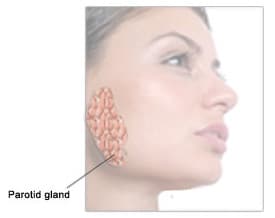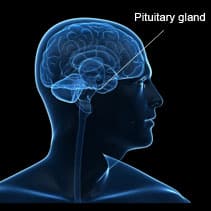The parotid glands are located near the ears, and produce saliva. The submandibular glands are located under the jaw, and also produce saliva. Swelling and/or pain in the gland may indicate infection, and is often associated with small stones in the salivary ducts blocking the flow of saliva. Growths may arise in the salivary glands, and may be benign or malignant.

Evaluation of parotid and submandibular gland problems begins with a thorough history and comprehensive examination of the head and neck. Radiologic evaluation may be necessary, and, if indicated, our doctors will perform a fine needle biopsy in the office, a minimally invasive test that leads to rapid, accurate diagnosis. Many salivary gland problems are treated with medication and other conservative therapy. If a tumor is present and removal warranted, our surgeons are trained in the latest techniques for safe removal of parotid and submandibular glands. Our practice serves Bayside, Queens, Long Island, and surrounding areas.
Swallowing
Difficulty swallowing, or dysphagia, may occur for a wide variety of reasons. Throat infections are the most common cause of dysphagia, and symptoms resolve with appropriate medical treatment. Enlarged tonsils or growths in the throat may interfere with the ability to swallow. Abnormal movement of the vocal cords may be associated with dysphagia, Many neurologic conditions, including stroke and Parkinson’s disease are associated with difficulty swallowing and choking symptoms. Evaluation of swallowing symptoms begins with a thorough history, complete examination of the head and neck, and fiberoptic evaluation of the throat. Treatment is directed at the underlying cause, and may include dietary modification and evaluation by a speech and swallowing therapist.
Pituitary/Skull Base Surgery
Pituitary tumors arise from the pituitary gland, which is located behind the sphenoid sinus and can be accessed through the nose. Dr. Werber has received advanced training and certification in minimally invasive skull base surgery techniques. Partnering with neurosurgical colleagues, Dr. Werber provides access to the brain through the nose, utilizing endoscopic sinus and skull base surgery techniques with computer image guidance.

Minimally invasive skull base surgery avoids external incisions, allows for improved visualization through the endoscopes, allowing for more complete tumor removal. This technique allows for more rapid recovery compared with traditional techniques.

